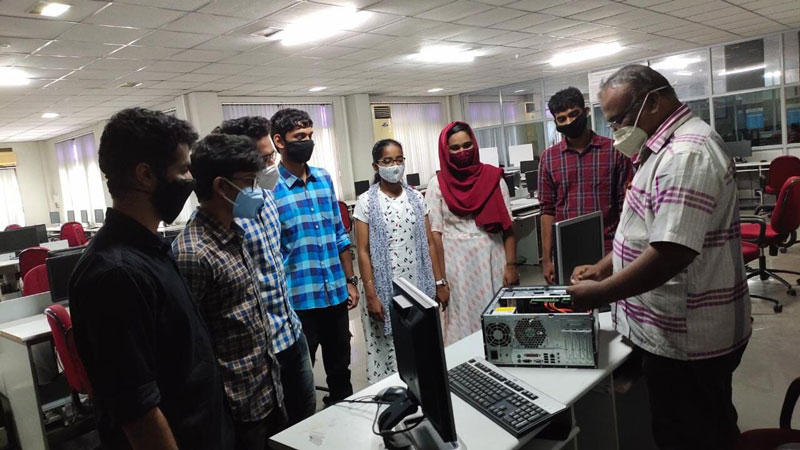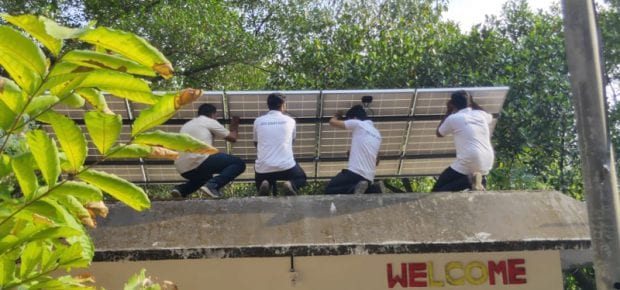April 22, 2021
Environmental technology can help clean up our oceans, air and other natural resources. Eco-friendly technology also gives us alternative solutions for keeping the Earth healthy.
We’re celebrating Earth Day by recognizing how IEEE and its members are making a positive impact on the environment.
Installing Hydroelectric Pumps for Clean Water
Members of the IEEE Uganda Section noticed a rural community was getting their water from informally-constructed dams. The community was also sharing that water with domestic animals. This type of treatment can make a community very sick.
With COVID-19 spreading across the globe, reliable access to water is crucial. Residents were more likely to contract the virus if they did not follow good hygiene practices, like frequent hand washing.
Through funding provided by the IEEE Humanitarian Activities Committee/ IEEE Special Interest Group on Humanitarian Technology (SIGHT), the volunteers installed a hydroelectric-powered water pumping system. This technology stores water in a tank for cleaner distribution to the community. Clean water means handwashing practices will help reduce the COVID-19 spread.

Creating ‘Smart’ Classrooms with Solar Power
Members of the IEEE student branch at the IEEE Viswajyothi College of Engineering are currently building sustainable power for classrooms. Utilizing this technology enables online virtual classes in remote areas during COVID-19.
The “smart classroom” setup uses solar panels to power computer systems and internet connections, allowing for more advanced learning opportunities.
The project also will include software and hardware computer training programs.
See also Technology Helps Us Monitor and Clean Up Our Waters
Establishing Technological Standards that Enable Sustainability
Sustainability is a key theme that cuts across IEEE Standards Association (IEEE SA) practices, programs and standards. Through consensus-based standards and related collaborative solutions, IEEE SA works to help enable sustainable, efficient and accessible energy through technological advances on a global scale.
“Not having standards would be a huge challenge – un-imaginable,” says IEEE Senior Member Maike Luiken in an article about World Standards Day. “It would slow down, if not halt entirely, the deployment of technology that is expected to enable sustainable development – i.e. clean electricity, internet connectivity, ubiquitous access to the internet, internet for all.”
Some standards priorities include smart energy solutions, including sustainable, low-carbon energy solutions, the use of renewable and distributed energy resources, energy storage, power grid modernization and optimization efforts of system operators globally.
Another set of standards focuses on energy efficiency by addressing energy consumption and applications in such areas as transportation electrification, efficiency initiatives for industrial consumers of energy and reduction of E-waste, recycling of electronic products and sustainable manufacturing practices.






 Liquid Infrastructure: Our Planet's Most Precious Resource
Liquid Infrastructure: Our Planet's Most Precious Resource The Impact of Technology in 2025
The Impact of Technology in 2025 Quantum and AI: Safeguards or Threats to Cybersecurity?
Quantum and AI: Safeguards or Threats to Cybersecurity? Why AI Can't Live Without Us
Why AI Can't Live Without Us Bits, Bytes, Buildings and Bridges: Digital-Driven Infrastructure
Bits, Bytes, Buildings and Bridges: Digital-Driven Infrastructure Impact of Technology in 2024
Impact of Technology in 2024 Emerging AI Cybersecurity Challenges and Solutions
Emerging AI Cybersecurity Challenges and Solutions The Skies are Unlimited
The Skies are Unlimited Smart Cities 2030: How Tech is Reshaping Urbanscapes
Smart Cities 2030: How Tech is Reshaping Urbanscapes Impact of Technology 2023
Impact of Technology 2023 Cybersecurity for Life-Changing Innovations
Cybersecurity for Life-Changing Innovations Smarter Wearables Healthier Life
Smarter Wearables Healthier Life Infrastructure In Motion
Infrastructure In Motion The Impact of Tech in 2022 and Beyond
The Impact of Tech in 2022 and Beyond Cybersecurity, Technology and Protecting Our World
Cybersecurity, Technology and Protecting Our World How Technology Helps us Understand Our Health and Wellness
How Technology Helps us Understand Our Health and Wellness The Resilience of Humanity
The Resilience of Humanity Harnessing and Sustaining our Natural Resources
Harnessing and Sustaining our Natural Resources Creating Healthy Spaces Through Technology
Creating Healthy Spaces Through Technology Exceptional Infrastructure Challenges, Technology and Humanity
Exceptional Infrastructure Challenges, Technology and Humanity The Global Impact of IEEE's 802 Standards
The Global Impact of IEEE's 802 Standards Scenes of our Cyber Lives: The Security Threats and Technology Solutions Protecting Us
Scenes of our Cyber Lives: The Security Threats and Technology Solutions Protecting Us How Millennial Parents are Embracing Health and Wellness Technologies for Their Generation Alpha Kids
How Millennial Parents are Embracing Health and Wellness Technologies for Their Generation Alpha Kids Space Exploration, Technology and Our Lives
Space Exploration, Technology and Our Lives Global Innovation and the Environment
Global Innovation and the Environment How Technology, Privacy and Security are Changing Each Other (And Us)
How Technology, Privacy and Security are Changing Each Other (And Us) Find us in booth 31506, LVCC South Hall 3 and experience the Technology Moon Walk
Find us in booth 31506, LVCC South Hall 3 and experience the Technology Moon Walk Virtual and Mixed Reality
Virtual and Mixed Reality How Robots are Improving our Health
How Robots are Improving our Health IEEE Experts and the Robots They are Teaching
IEEE Experts and the Robots They are Teaching See how millennial parents around the world see AI impacting the lives of their tech-infused offspring
See how millennial parents around the world see AI impacting the lives of their tech-infused offspring Take the journey from farm to table and learn how IoT will help us reach the rising demand for food production
Take the journey from farm to table and learn how IoT will help us reach the rising demand for food production Watch technical experts discuss the latest cyber threats
Watch technical experts discuss the latest cyber threats Explore how researchers, teachers, explorers, healthcare and medical professionals use immersive technologies
Explore how researchers, teachers, explorers, healthcare and medical professionals use immersive technologies Follow the timeline to see how Generation AI will be impacted by technology
Follow the timeline to see how Generation AI will be impacted by technology Learn how your IoT data can be used by experiencing a day in a connected life
Learn how your IoT data can be used by experiencing a day in a connected life Listen to technical experts discuss the biggest security threats today
Listen to technical experts discuss the biggest security threats today See how tech has influenced and evolved with the Games
See how tech has influenced and evolved with the Games Enter our virtual home to explore the IoT (Internet of Things) technologies
Enter our virtual home to explore the IoT (Internet of Things) technologies Explore an interactive map showcasing exciting innovations in robotics
Explore an interactive map showcasing exciting innovations in robotics Interactively explore A.I. in recent Hollywood movies
Interactively explore A.I. in recent Hollywood movies Get immersed in technologies that will improve patients' lives
Get immersed in technologies that will improve patients' lives